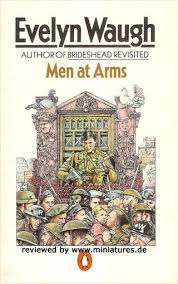Genre
Audience
Author’s Worldview
Year Published
Themes
Reviewed by
G.M. Baker
To most Catholic readers, the name Evelyn Waugh is indelibly associated with the novel Brideshead Revisited, and justly so, since Brideshead is one of the great novels of the 20th century and arguably the greatest Catholic novel ever written. But the Catholic reader, in particular, would be missing a great deal if they did not also read Waugh’s World War II trilogy, Sword of Honor, of which the first volume is Men at Arms.
Men at Arms is, in many ways, a more obviously and directly Catholic novel than Brideshead Revisited, in that it deals with the moral and practical challenges of living a Catholic life in a society whose attitudes and mores are very different, and also the very present concern of balancing one’s allegiance to and love of the Church with an allegiance to and love of a country that separated itself from the Church long ago.
On the eve of World War II, Guy Crouchback, the last male heir of an ancient recusant family (a prominent English family that remained Catholic after the reformation in England), is living alone in an Italian village where his family has property. Eight years before, his wife left him for another man, leaving him without issue. Guy has been living aimlessly ever since, disconnected even from the stoutly Catholic village in which he lives. The outbreak of war seems to offer him an opportunity to regain purpose in his life, but at thirty-six, few of the regiments he applies to are interested in taking him on as a temporary officer. Through a family acquaintance, he is taken on by the Corps of Halberdiers, an ancient and proud regiment. Here, he becomes one of the two “uncles” of the regiment, men far older than normal for their ranks, along with the absurd and vainglorious Apthorp.
While Guy falls completely in love with the Halberdiers, he struggles to find the clarity of purpose that he has sought, and his Catholicism presents difficulties both practical and social. This is not a book of reckless courage with bullets flying everywhere. Rather, it presents a realistic portrait of the absurdity of army life in the early period of the war, with its endless, pointless movements and alarms. The fall of Norway and of France and the evacuation from Dunkirk are but items of news to a regiment that is endlessly being trained and equipped for this and that, and endlessly shuffled about. And when Guy finally does see a bit of action, it is a shambles that, though no fault of his own, “blots his copybook,” to use the schoolboy term used by his comrades, and separates him from his beloved regiment.
Waugh is one of the great satirists of English literature, and Men at Arms is one of his greatest achievements, not because it builds on the savagery of some of his earlier works, but because there is a maturity to its satire that elevates it and makes it something very fine that even readers like me, who normally have no great taste for satire, can not only appreciate but love. The typical satirist is a partisan. In their satires, the world is divided into the wise (which, of course, included themselves) and the foolish (other people). Their satire is essentially derisive, belittling, and divisive. But Waugh, like that other great satirist, Jane Austen, sees the absurdity in the wise and the foolish alike and reveals it. They grasp and they reveal the absurdity of all of us, and, in doing so, discover affection even for the most absurd of creatures. Apthorpe, by far the most absurd of all the characters in Men at Arms, is also the figure of the greatest pathos and the one to whom Guy discovers and displays the greatest charity, even as he delights in his absurdity.
Readers familiar with Brideshead Revisited will notice the recurrence of a trope from that novel, the illicit gift of a bottle of whisky to a hospital patient. The repetition here serves to reinforce the interesting questions around the nature and obligations of charity that are raised by the incidents individually.
The Sword of Honor trilogy has been called the greatest novel to come out of World War II, a judgment I am happy to endorse. For those who have read and enjoyed Brideshead Revisited, the Sword of Honor trilogy is an essential next read, a step into the world of the War that forms merely a frame story for Brideshead. For those who have not read Brideshead and may perhaps be put off by its bulk and its reputation, the comparatively short and more easily approachable Men at Arms, with its more straightforward Catholic themes, could provide a gentler on-ramp to Waugh’s work. In either case, it is highly recommended for readers of all faiths and none.



